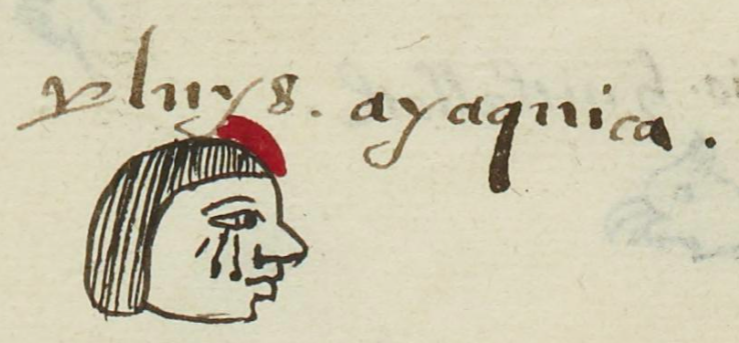Ayaquica (MH526r)
This black-line drawing of the simplex glyph for the personal name Ayaquica (or Ayac Ica, literally "With No One" or "Alone") shows a man's head in profile, facing toward the viewer's right. Tears stream down his cheeks, which supports a reading of his being emotional, whether he is sad because he is alone or because someone is departed (yaqui). But the tears could also be a phonetic indicator that this name begins with A-, and if so, then this is a compound glyph, not a simplex.
Stephanie Wood
This name--if deciphered correctly--is a complete sentence whereby the verb (to be) is implied, something very common in Nahuatl alphabetic and hieroglyphic writing. This sentence also includes a preposition (with, ica) and an indefinite pronoun or adverb (no one, ayac). If we consider the ayac to mean "no one is there," then we can consider ayac to be an adverb here. The expression of apparent emotion is a valuable example, too. Perhaps it is another way of referring to a widow or a widower. For other suggestions of emotion and of sentences with the implied verb "to be," please see below.
Stephanie Wood
luys ayaquica
Luis Ayaquica (or Ayac Ica)
Stephanie Wood
1560
Daniel Chayet and Stephanie Wood
tears, lágrimas, tristeza, sadness, alone, solo, solito, solitario, triste, vulnerable, nombres de hombres

ayac, no one, https://nahuatl.wired-humanities.org/content/ayac
ica, with, https://nahuatl.wired-humanities.org/content/ica
a(tl), water, https://nahuatl.wired-humanities.org/content/atl
Nadie Consigo
Stephanie Wood
Matrícula de Huexotzinco, folio 526r, World Digital Library, https://www.loc.gov/resource/gdcwdl.wdl_15282/?sp=131&st=image.
This manuscript is hosted by the Library of Congress and the World Digital Library; used here with the Creative Commons, “Attribution-NonCommercial-ShareAlike 3.0 License” (CC-BY-NC-SAq 3.0).












